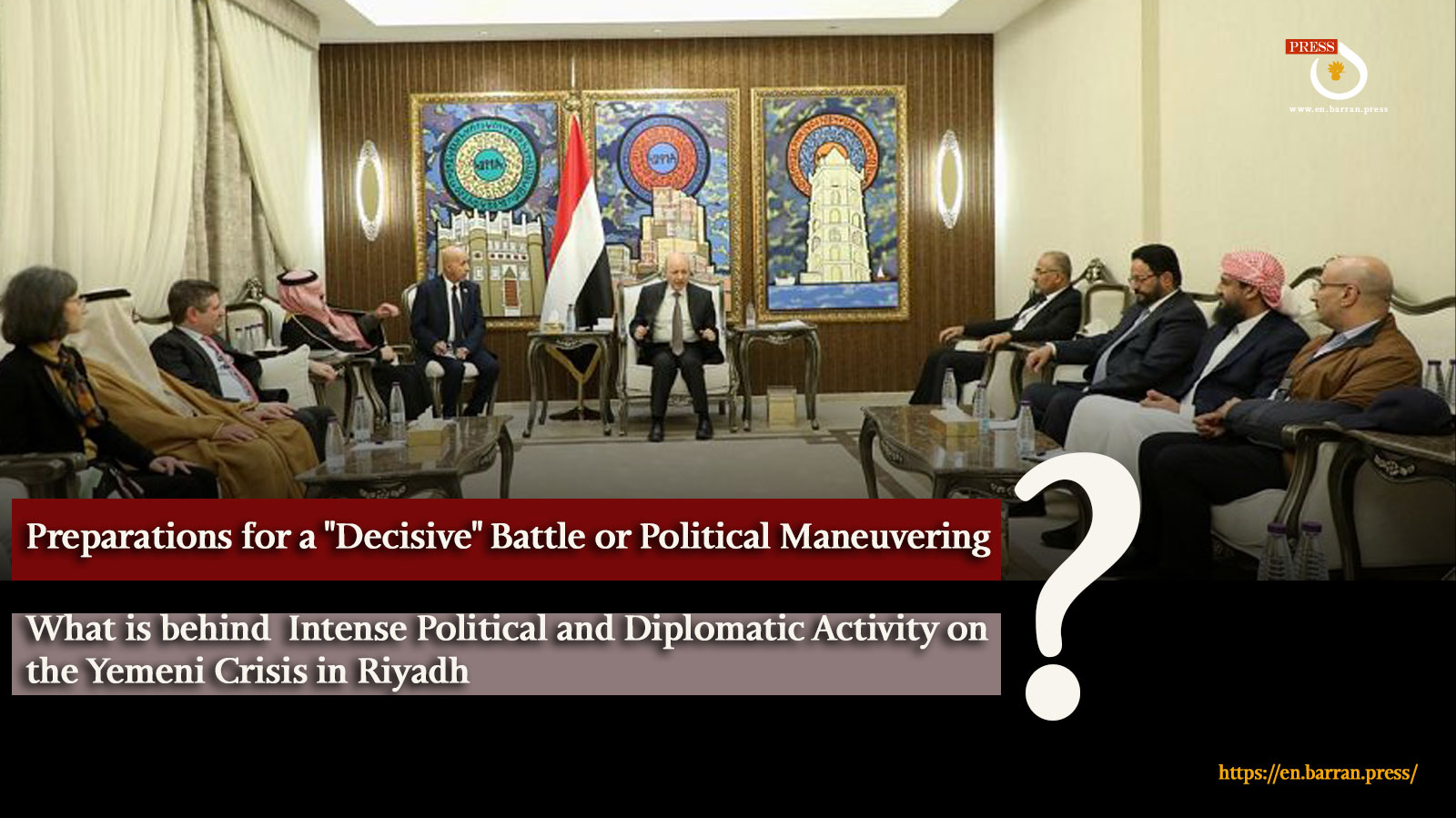


Barran Press - Nawaf AlHemyari
Since the recent developments in Syria and the fall of the Assad regime, Riyadh has become a hub of intense political and diplomatic activity. This movement, led by the internationally recognized Yemeni government and key international actors involved in the Yemeni file, raises questions about its implications.
This surge in activity includes a series of separate meetings between the President of the Presidential Leadership Council and Council members with ambassadors and representatives of countries involved in the Yemeni issue, and the Joint Operations Commander of the Arab Coalition supporting the Yemeni government.
These meetings come in the wake of significant blows to Tehran in Syria and Lebanon, following the reduction of Hezbollah's influence and the fall of Bashar al-Assad's regime. Such developments have fueled Yemeni aspirations for a similar scenario to end the Iranian-backed coup at minimal cost, especially after the setbacks Tehran has faced in Lebanon and its diminished control over Damascus.
"Barran Press" explores whether this intensified activity signals new developments on the Yemeni front and whether there is an international desire to reduce Iranian influence in the region, considering the Houthi group, classified as a terrorist organization, is an extension of Iranian influence.
Rallying International Public Opinion
Khaled Al-Najjar, Professor of Political Geography at Taiz University, stated that the "unity of the fronts" once championed by Iran and its allied militias is now "almost nonexistent," with most of them having fallen. This, he noted, will impact the Yemeni file, especially after the events in Syria.
Al-Najjar told "Barran Press" that "there are discussions believed to be aimed at rallying international and regional public opinion to support the battle to liberate Yemen from the Houthi militias and rid the region of these militias' threats to navigation and international security."
He explained that these meetings and statements by many international officials suggest "potential movements in the coming phase, especially after the expulsion of the Houthi delegation from Oman."
Return of the Battle
Waddah Al-Dubeish, spokesperson for the Joint Forces on the West Coast, stated that "the international community has realized there can be no peace with Iran and its proxies except by uprooting its arms in the region; they have closed all options for peace, especially after the Houthis have become a significant threat to international and regional navigation."
He added in his conversation with "Barran Press" that "there are significant indications of the battle's return and the completion of the liberation of the remaining Yemeni territories from the coup's grip. We are awaiting the outcomes of these meetings and consultations as a military resolution requires international consensus to support the legitimate government."
The military spokesperson believes "there are political indications from these discussions, but the military indicators are still unclear and undisclosed."
International Consensus
Political Geography Professor Al-Najjar stated in his discussion with "Barran Press" that "what happened in Syria has repercussions on the Yemeni file," adding that "the Houthis consider themselves the protectors of the Iranian entity and its first line of defense."
In his view, there is "an international consensus to end Iran's arms in the region and defuse regional conflicts," noting that "these intense negotiations and meetings are aimed at either reinforcing peace or moving towards a military resolution and pressuring the Houthis."
He believes "the situation is heading towards a political and military resolution, especially since the Houthis do not adhere to any agreements and still maintain high demands despite knowing their international backer is currently experiencing its worst period."
A New Equation
Dr. Faris Al-Beel, head of the Future Yemen Center for Strategic Studies, told "Barran Press" that the equation regarding the Houthis has changed, noting that there was once an international desire to disengage the group from the Iranian axis and transform it into a political entity, integrating it into the Yemeni system for coexistence.
He added that "the international community believed it was impossible or illogical to remove the Houthi group, considering it would not abandon force and integrate into the political project, a view that persisted for years."
"The community later realized that the Houthis aim to integrate into a destructive international project and that their ability to cause harm is detrimental to the global economy," he said.
In his opinion, the international community can no longer tolerate the Houthis' actions, and the perception has changed: they cannot become a part of the Yemeni state, evidenced by their breaching of agreements and shifting to serve the Iranian project.
"There is a clear international desire to remove all forces allied with Iran in the region, especially recently with the fall of Hezbollah and the Assad regime, regarded as Iran's formidable axis," he said, adding that "this has led to instability among the remaining factions allied with Iran."
Internal Disintegration
Politician Al-Najjar noted "internal protests in Houthi-controlled areas," explaining that "these protests have escalated from peaceful to armed, such as those by the tribes in Ibb, Bani Matar, and Amran."
"These tribes live under conditions of oppression and humiliation, putting the Houthi entity at serious risk, especially with the unfavorable regional and international circumstances for any Houthi obstinance," he added.
Simultaneously, amid political movements in Riyadh and talk of a "military resolution," the Iran-backed Houthi group, internationally classified as a terrorist organization, threatened to target American interests in the region if there were any military escalation against them, acknowledging the dangerous phase.
The group's leader's uncle, who serves as Interior Minister in the unrecognized Houthi government, Abdul Karim Al-Houthi, said, "Yemen is going through a dangerous phase today that requires everyone to raise their vigilance and sense of responsibility to thwart the malicious conspiracies being plotted against it."
During his meeting with senior leaders in the group's unrecognized Interior Ministry, he emphasized "the necessity of fully implementing instructions and directives."